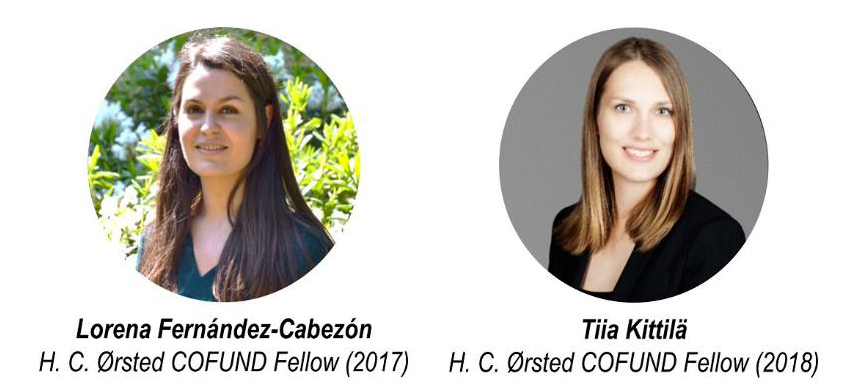
The Novo Nordisk Foundation postdoctoral programme supports Mariela Mezzina and Nicolas Krink
The Novo Nordisk Foundation (NNF) supports
talented postdoctoral researchers working in the Nordic Region
in research projects within biotechnology-based synthesis and
production as well as projects of industrial and environmental
biotechnology. These fellowships support fundamental and
applied research projects that promote sustainable bio-based
products.
Mariela Mezzina moved from her hometown in Argentina to
Denmark at the beginning of 2019 to join the SEM group, funded
by the NNF Postdoctoral Fellowship for Biotechnology-based
synthesis. Since then, she leads the efforts in her PHAME (Phasin-mediated
polyhydroxyalkanoate metabolic channeling platform for
efficient bioproduction in bacteria) project. In this
context, Mariela will develop a synthetic platform based on
biopolymers coupled to efficient synthetic pathways for the
production of value-added chemicals.
Nicolas Krink comes from Germany, with a background that
includes research stays at the University of Freiburg,
Stanford University, Center for Interdisciplinary Research
(CRI) in Paris, and the JointBioEnergy Institute in Berkeley.
He recenlty obtained his Ph.D. at the Max-Planck-Institute for
Terrestrial Microbiology in Marburg. Nico joined the SEM group
in September 2020 and will be funded by the NNF Postdoctoral
Fellowships for research within industrial biotechnology and
environmental biotechnology. He is going to work on the DF2AP2
project (Dynamic fluoro-fatty acid production platform).
DF2AP2 aims at providing a sustainable
production for long-chain fluorinated molecules. Further,
following the principle of Learning from nature,
create nature he will design metabolic control networks
inspired by nature to improve the stable production of
new-to-nature compounds.

SinFonia: Paving the way towards the production of sustainable fluorinated polymers
The SEM group is excited to lead the
efforts in the European Commission H2020-funded consortium
SinFonia. We coordinated 13 partners from 12 different
countries with a single goal: producing fluoropolymers in a
biological way using our favorite pet Pseudomonas putida.
Check out the SinFonia
website for more information, updates on the project and
videos!
An also the press release from DTU Biosustain on a milestone
publication on the project:
https://madmagz.com/magazine/1846979#/page/16
New publications by the SEM group!
Check out our Publications section to find the latest contributions of our group in Metabolic Engineering, Microbial Biotechnology and Advanced BioSystems.
Read More
Lorena Fernández-Cabezón and Tiia Kittilä supported by the H. C. Ørsted COFUND post-doctoral programme
The H. C. Ørsted COFUND post-doctoral
programme of the Technical University of Denmark, co-funded by
Marie Skłodowska-Curie Actions, supports highly talented
experienced researchers who have achieved outstanding results
in their research while demonstrating excellence and potential
in their field. Lorena Fernández-Cabezón joined the SEM group
in November 2017, supported by the H. C. Ørsted COFUND
post-doctoral programme, to carry out REWIRE (Re-shaping
central metabolism in Pseudomonas putida for White
Biotechnology purposes). In this project, Lorena will re-write
the central catabolism of P. putida for the efficient
utilization of sugars.
In 2018, Tiia Kittilä, from the Enzyme Engineering and
Structural Biology group headed by Ditte Hededam Welner in our
center, earned an H. C. Ørsted fellowship to work in BIOFLUOR
(Engineering fluorinase enzyme for the bioproduction of
new-to-Nature fluorochemicals). This exciting collaborative
project is a joint initiative of the Enzyme Engineering and
Structural Biology and SEM groups, and aims at designing
efficient biocatalysts for the in vitro synthesis of
added-value organofluorines.
Sweet news for the SEM group: funding by the Danish Council for Independent Research
We are excited to announce that the Danish Council for Independent Research (Ministry of Higher Education and Science) will support our activities starting in 2019 through a Research and Innovation Grant. In SWEET (Systematic re-writing of the metabolic lifestyle in environmental bacteria), we will stablish novel catabolic pathways in P. putida to streamline the metabolism of sugars and facilitate their conversion into added-value biochemicals.
Lorena showcased in the Biosustain Magazine
As a H.C. Ørsted fellow, Lorena Fernández-Cabezón will contribute to the mission of the SEM group and the Center for Biosustainability of developing novel and robust bacterial cell factories for the sustainable production of chemicals. Read all about it in the DTU Biosustain news!
Read More
From Argentina to Denmark… and back!
Pablo visited his Alma Mater (University of San Martín, Argentina) in 2017, where he discussed the projects of the newly stablished SEM group with his former colleagues. Pablo was also interviewed by the university press; the interview (in Spanish) can be accessed here:
Read More